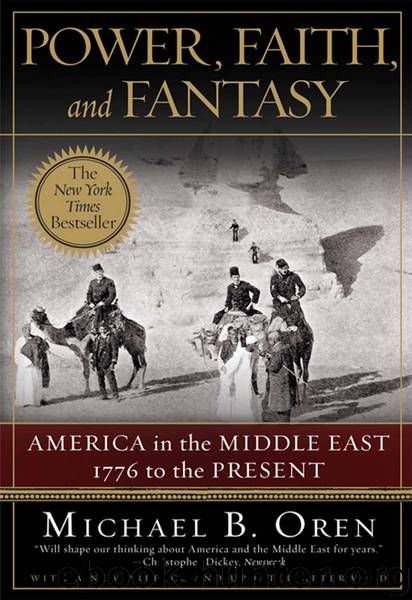Power, Faith, and Fantasy: America in the Middle East: 1776 to the Present by Michael B. Oren

Author:Michael B. Oren [Oren, Michael B.]
Language: eng
Format: mobi
Publisher: W. W. Norton & Company
Published: 2008-02-16T16:00:00+00:00
Ebb and Flow
Saudi oil and Saudi contracts together infused fresh vitality into an American industry long wearied by massive unemployment and economic depression. The reaction of the U.S. government, however, remained stolid. “We should let matters stand as they now are until such a time as American interests in Saudi Arabia have made further developments,” the State Department, rejecting yet another proposal for establishing diplomatic ties with the kingdom, concluded in May 1937. Americans were still investing more in mission schools and churches (roughly $4.5 million per year) than in Middle Eastern rigs. The department continued to balk at the notion of impinging in an area it still considered a British bailiwick, and of opening a consulate solely to serve the employees of a single American corporation.
Yet not even the State Department’s obduracy could conceal the fact that the output of Persian Gulf wells had increased 900 percent since 1920 and that the United States now received 14 percent of its petroleum from the Middle East. Oil in economic quantities had also been discovered in Kuwait—a joint Anglo-American venture—and evidence pointed to the existence of plenteous reserves in another Persian Gulf emirate, Qatar. Oil company officials persistently reminded American policymakers of the immense economic potential of Arabia and the Gulf and stressed the many affinities, cultural as well as political, between the people of the region and those of the United States.
“Though outwardly autocratic in several respects,” Karl Twitchell submitted, “the [Saudi] government…shows certain aspects of democracy.” Twitchell was only one of the many Americans who, in the 1930s, returned from working stints in Saudi Arabia brimming with praise for its tolerant, freedom-loving, and inveterately pro-American king and his subjects. And few Americans were more admiring of these purported Saudi traits than Charles Crane. Now in the last years of his life—he died in 1939—and deeply enamored of the leader he called “the real bulwark of Christian culture,” Adolf Hitler, Crane also remained a fierce advocate for close ties between the United States and Saudi Arabia, and an unstinting devotee of its king. “Ibn Saud,” he assured President Roosevelt, “is the most important man who has appeared in Arabia since the time of Mohammed,” thirteen hundred years earlier.
Many of these glowing assessments of ibn Saud and his kingdom were, partly or wholly, mythic. There was no democracy in Saudi Arabia and only provisional tolerance for non-Muslims. “We Muslims have the one, true faith,” ibn Saud matter-of-factly informed one American diplomat. “We will use your iron, but leave our faith alone.” And while generally loyal to the United States, ibn Saud displayed no reservations about negotiating with Britain and France in order to extract higher contract fees from the Americans. Indeed, when asked by American negotiators why he favored the United States over the Europeans, ibn Saud candidly replied, “You are very far away!”
And yet, in spite of its less savory realities, Arabia continued to evoke wonder among many of the Americans who worked there. These included representatives of a new amalgamated type of missionary, businessman, and diplomat.
Download
This site does not store any files on its server. We only index and link to content provided by other sites. Please contact the content providers to delete copyright contents if any and email us, we'll remove relevant links or contents immediately.
| Arms Control | Diplomacy |
| Security | Trades & Tariffs |
| Treaties | African |
| Asian | Australian & Oceanian |
| Canadian | Caribbean & Latin American |
| European | Middle Eastern |
| Russian & Former Soviet Union |
The Secret History by Donna Tartt(19026)
The Social Justice Warrior Handbook by Lisa De Pasquale(12182)
Thirteen Reasons Why by Jay Asher(8883)
This Is How You Lose Her by Junot Diaz(6869)
Weapons of Math Destruction by Cathy O'Neil(6260)
Zero to One by Peter Thiel(5782)
Beartown by Fredrik Backman(5733)
The Myth of the Strong Leader by Archie Brown(5491)
The Fire Next Time by James Baldwin(5422)
How Democracies Die by Steven Levitsky & Daniel Ziblatt(5210)
Promise Me, Dad by Joe Biden(5139)
Stone's Rules by Roger Stone(5078)
A Higher Loyalty: Truth, Lies, and Leadership by James Comey(4946)
100 Deadly Skills by Clint Emerson(4911)
Rise and Kill First by Ronen Bergman(4775)
Secrecy World by Jake Bernstein(4738)
The David Icke Guide to the Global Conspiracy (and how to end it) by David Icke(4696)
The Farm by Tom Rob Smith(4500)
The Doomsday Machine by Daniel Ellsberg(4481)
